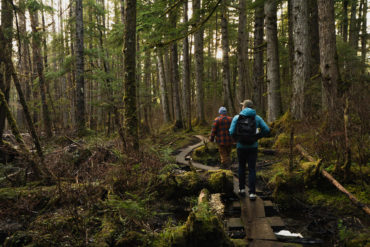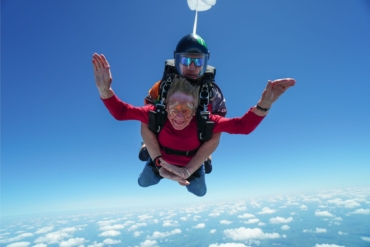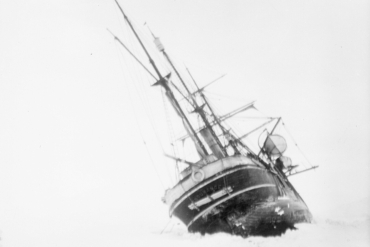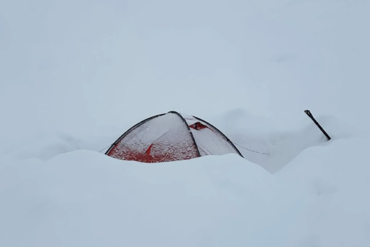Teams would have to navigate by sight and by compass, but were almost steered through the valleys by their natural course, often winding up following river beds netted with rotten trees that would give way as they bashed through and thorny bushes that tore their hands and legs apart on every move. On occasion there would be the opportunity to rise up out the forest and experience some of the wild mountain and glacier scenery that this part of the world is famed for, but often those opportunities, taken on a whim to shave off the odd hour or two from the trek, would lead teams the wrong way and force them to backtrack to the forest.

Swells, waves and frigid waters on a kayaking leg
“It is how you imagine it when you hear children’s stories of horrible forests where there are branches hanging down and thorns trying to catch you,” explained Macleod. “Our hands got caught by ‘evil forest holly’ all the way across, and it sticks in you. But we dealt with each plant in its own way and got a good strategy towards the end.”
It would be 120km and two and a half days, at the very best, before they saw anyone again.
Taking 30-minute sleeps here and there, and stopping for the odd 30-second nap whenever they had a spare moment, Helly Hansen progressed slowly, in persistent rain, past waterfalls being blown uphill by strong winds, through the twisted, ancient rotting forest.
Meanwhile, behind them, the health of Easy Implant captain Rey was rapidly deteriorating. Severely hypothermic, he was shivering, with a lack of food and the decision to take bivvy bags rather than tents making life very unpleasant.
Team member Jari Kirkland, explained: “Bruno had a rough race, I took everything out of his pack so he didn’t have to carry weight and you could tell he was still suffering. But he never complained once, which says a lot about the man. I took 60 hours worth of food on that trek, and they probably took 36, so I had to give away all my food.”
Spirit Canada made it through onto the trek, as did Calleva, but Almas Patagonicas gave up and Buff, with Juan Jose Alonso Checa suffering a broken wrist, almost quit kayaking but continued, only to quit when a swarm of mosquitoes attacked Chemari Bustillo. His face badly swollen, he was advised not to take on the mammoth trek. “We had the motivation to continue but we had to make it through that trek on our own,” explained Bustillo, whose team knew no assistance would be able to make it through the forest once they were in there.

Team Helly Hansen Prunesco, the race winners
Helly Hansen came close to disaster several times, jumping a half-metre gap onto a soft soil platform 10m above a fast-running river torrent and cutting up a pass to end up on a 100m overhang clinging to decaying tree roots. Then they returned to the forest and boggy terrain for the long slog home.
“The moss is like nothing I have seen anywhere,” said Helly Hansen’s Andy Wilson. “It was so squishy, you would put your foot on it and just disappear. It was really tiring.” Duncan added: “In the trees, you’d think you were on the ground but you’d actually walked twelve feet up, so you would have to jump down again. Mentally it was getting really tough.”
Little did they know how hard it was for one of their rivals, Calleva, who had taken a wrong turn early on and were now lost, heading down the wrong valley to try and escape to the sea. They were desperately trying to find a quick route to the finish line, racing for survival rather than victory. “We had run out of food for a day and we needed to take a shortcut,” explained Druce Finlay. “We got lost in the river valley and we were so tired, so we went to a ridge and decided that we could save eight miles if we went a different way.” But the organisers had explained there was just one real way out, and Calleva were heading for trouble.
Back at the front, Helly Hansen finally saw the sea and emerged, battered and bruised, hands and legs pitted and ripped apart by the forest bushes, to take the victory, the first for a British team in a major overseas adventure race, in around six and a half days. But really, in this race, making the finish is a victory in itself — something just three full teams achieved this year.
Easy Implant came in nineteen hours later to finish second, and Spirit Canada arrived the morning after that. Rey had pushed his body to its very limits and spent a day in the medical tent at the Cape before being taken to a hospital.
But Team Calleva was still out there, continuing their escape bid by trying to coasteer around the sea cliffs, twice being forced to swim in the icy water of the Straits of Magellan. Eventually, the two members who did not have hypothermia decided to risk all and take on a ropeless rock climb to reach the cross at the finish.

The pair made it just around the 10-day cut-off time and were able to release an SOS beacon, alerting the race organizers to their arrival. The helicopter that was searching the forests for the missing racers was re-directed to collect them from the cross and the other two from the beach and return them to Punta Arenas. Classified fourth place, their victory was simply one of survival.
Many competitors, with experience between them of almost all the top events an adventure racer can take on, admitted that this year’s Wenger Patagonian Expedition Race was the toughest event they have ever entered. Reflecting on the experience while warming herself around a campfire on the beach at Cabo Froward, Macleod said: “Just from looking at the pictures, knowing we were going to Patagonia, which is somewhere all of us have always wanted to visit, I thought it was going to be incredible….and I was not wrong.”
She continued: “It was an amazing race. It is an amazing chance to explore Patagonia in depth, on your own, in an adventurous environment. It certainly met my expectations, and the fact we managed to win it blew them away! And I know that I speak for many of the competitors here when I tell you that I can’t wait to come back.”
—UK-based freelance journalist Will Gray reported from Patagonia.






